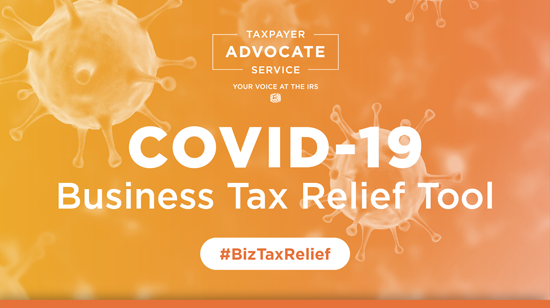
Need relief for employment taxes? Here’s a simple way to find out what your options might be under the Coronavirus Aid, Relief, and Economic Security Act (CARES Act) and/or the Families First Coronavirus Response Act (FFRCA).
What Are the Tax Relief Options?
- Employee Sick and Family Leave Reimbursement: Eligible businesses (including certain self-employed persons) are entitled to receive a credit in the full amount of the required sick leave and family leave paid to employees unable to work because of coronavirus quarantine or seeking a medical diagnosis, caring for someone with coronavirus, or caring for a child because the child’s school or place of care is closed, or the paid child care provider is unavailable due to the pandemic.
- Employee Retention Credit: Eligible businesses and nonprofits can claim this credit by reducing upcoming deposits or requesting an advance credit equal to 50 percent of qualified wages of up to $10,000 (including allocable qualified health plan expenses) paid after March 12, 2020, and before January 1, 2021, for a maximum credit of $5,000 per employee.
- Employer Payroll Tax Deferral: Through December 31, 2020, businesses can defer payment of the employer’s share of certain employment taxes. Half of the deferred amounts must be paid by the end of 2021 and half must be paid by the end of 2022.
How Might Theses Options Benefit Your Business?
By providing your business with additional funds to keep running and/or pay to retain employees. If eligible, your business can be immediately reimbursed for the credit by reducing your payroll tax deposits, claiming the credit on your employment tax forms, or requesting an advance payment of the credit by submitting Form Form 7200.
How Does It Work?
The tool is available online 24/7, and only takes a few minutes to complete to determine if your business may be likely to qualify for any for any of the available tax relief options.
- Visit our COVID-19 Business Tax Relief Tool.
- Answer a few questions about your business.
- Find out if you may be likely to qualify or not. While not intended to replace formal guidance or provide an official qualification determination, the tool, using the information you provide, will provide general information what if any tax relief your business may likely be eligible for and link you to information about the next steps needed to claim the benefit.
Help Us Spread the Word
Help businesses affected by the COVID-19 pandemic understand tax relief options to stay in business. Even if you don’t own a business, maybe you have clients or other people that you know that do? If yes, please help us spread the word about this new tool to employers with employees who may benefit from a potential tax break.
You can help businesses stay in business by:
- Downloading this flyer (PDF) to email it, print it and share it, or post a copy to your website.
- The flyer also contains a Quick Response (QR) code that will open up the tool directly when the camera is used on a mobile device.
- Sharing this link on your social media account and encouraging people to visit: taxpayeradvocate.irs.gov/BizTaxReliefTool.
More Resources
IRS Resources
- Employee Retention Credit
- Employee Retention Credit FAQs
- Paid Family Leave and Sick Leave FAQs
- New Employer Tax Credits
- Coronavirus Tax Relief and Economic Impact Payments
- Deferral of employment tax deposits and payments through December 31, 2020
TAS Resources
Taxpayer Advocate Service Help
The Taxpayer Advocate Service (TAS) is uniquely positioned to assist all taxpayers (and their representatives), including individuals, businesses, and exempt organizations. If you qualify for our help, an advocate will be with you at every turn and do everything possible to assist through the process.
Currently, TAS is open to virtually serve taxpayers who find themselves in hardship situations or dealing with IRS tax problems they’ve been unable to resolve directly with the IRS. Visit our Contact Us page to learn more.
You can also follow the Taxpayer Advocate Service across social media: Twitter, Facebook, LinkedIn and YouTube for the latest news
Source: taxpayeradvocate.irs.gov

Leave a Reply